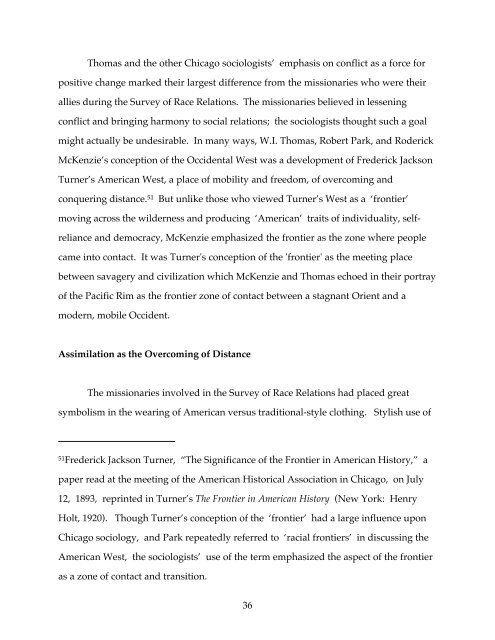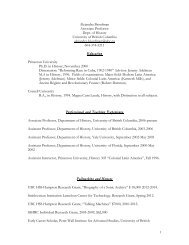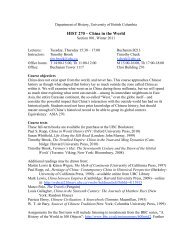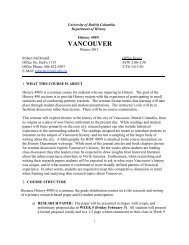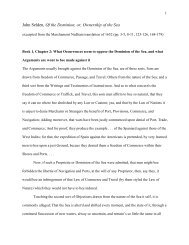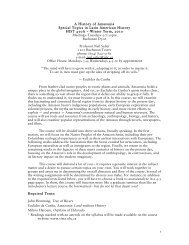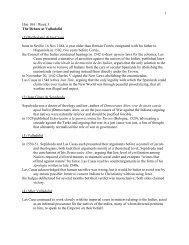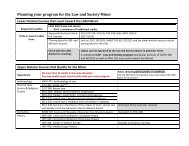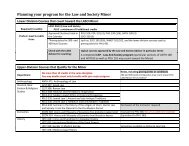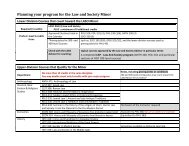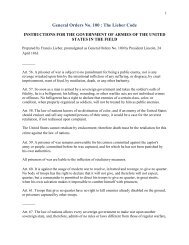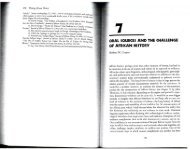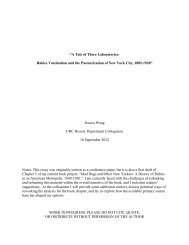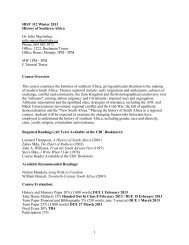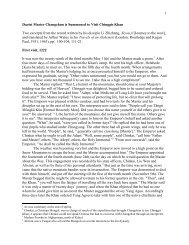Orientalizing the Pacific Rim: - History, Department of
Orientalizing the Pacific Rim: - History, Department of
Orientalizing the Pacific Rim: - History, Department of
You also want an ePaper? Increase the reach of your titles
YUMPU automatically turns print PDFs into web optimized ePapers that Google loves.
Thomas and <strong>the</strong> o<strong>the</strong>r Chicago sociologists’ emphasis on conflict as a force for<br />
positive change marked <strong>the</strong>ir largest difference from <strong>the</strong> missionaries who were <strong>the</strong>ir<br />
allies during <strong>the</strong> Survey <strong>of</strong> Race Relations. The missionaries believed in lessening<br />
conflict and bringing harmony to social relations; <strong>the</strong> sociologists thought such a goal<br />
might actually be undesirable. In many ways, W.I. Thomas, Robert Park, and Roderick<br />
McKenzie’s conception <strong>of</strong> <strong>the</strong> Occidental West was a development <strong>of</strong> Frederick Jackson<br />
Turner’s American West, a place <strong>of</strong> mobility and freedom, <strong>of</strong> overcoming and<br />
conquering distance. 51 But unlike those who viewed Turner’s West as a ‘frontier’<br />
moving across <strong>the</strong> wilderness and producing ‘American’ traits <strong>of</strong> individuality, selfreliance<br />
and democracy, McKenzie emphasized <strong>the</strong> frontier as <strong>the</strong> zone where people<br />
came into contact. It was Turner's conception <strong>of</strong> <strong>the</strong> 'frontier' as <strong>the</strong> meeting place<br />
between savagery and civilization which McKenzie and Thomas echoed in <strong>the</strong>ir portray<br />
<strong>of</strong> <strong>the</strong> <strong>Pacific</strong> <strong>Rim</strong> as <strong>the</strong> frontier zone <strong>of</strong> contact between a stagnant Orient and a<br />
modern, mobile Occident.<br />
Assimilation as <strong>the</strong> Overcoming <strong>of</strong> Distance<br />
The missionaries involved in <strong>the</strong> Survey <strong>of</strong> Race Relations had placed great<br />
symbolism in <strong>the</strong> wearing <strong>of</strong> American versus traditional-style clothing. Stylish use <strong>of</strong><br />
51 Frederick Jackson Turner, “The Significance <strong>of</strong> <strong>the</strong> Frontier in American <strong>History</strong>,” a<br />
paper read at <strong>the</strong> meeting <strong>of</strong> <strong>the</strong> American Historical Association in Chicago, on July<br />
12, 1893, reprinted in Turner’s The Frontier in American <strong>History</strong> (New York: Henry<br />
Holt, 1920). Though Turner’s conception <strong>of</strong> <strong>the</strong> ‘frontier’ had a large influence upon<br />
Chicago sociology, and Park repeatedly referred to ‘racial frontiers’ in discussing <strong>the</strong><br />
American West, <strong>the</strong> sociologists’ use <strong>of</strong> <strong>the</strong> term emphasized <strong>the</strong> aspect <strong>of</strong> <strong>the</strong> frontier<br />
as a zone <strong>of</strong> contact and transition.<br />
36


